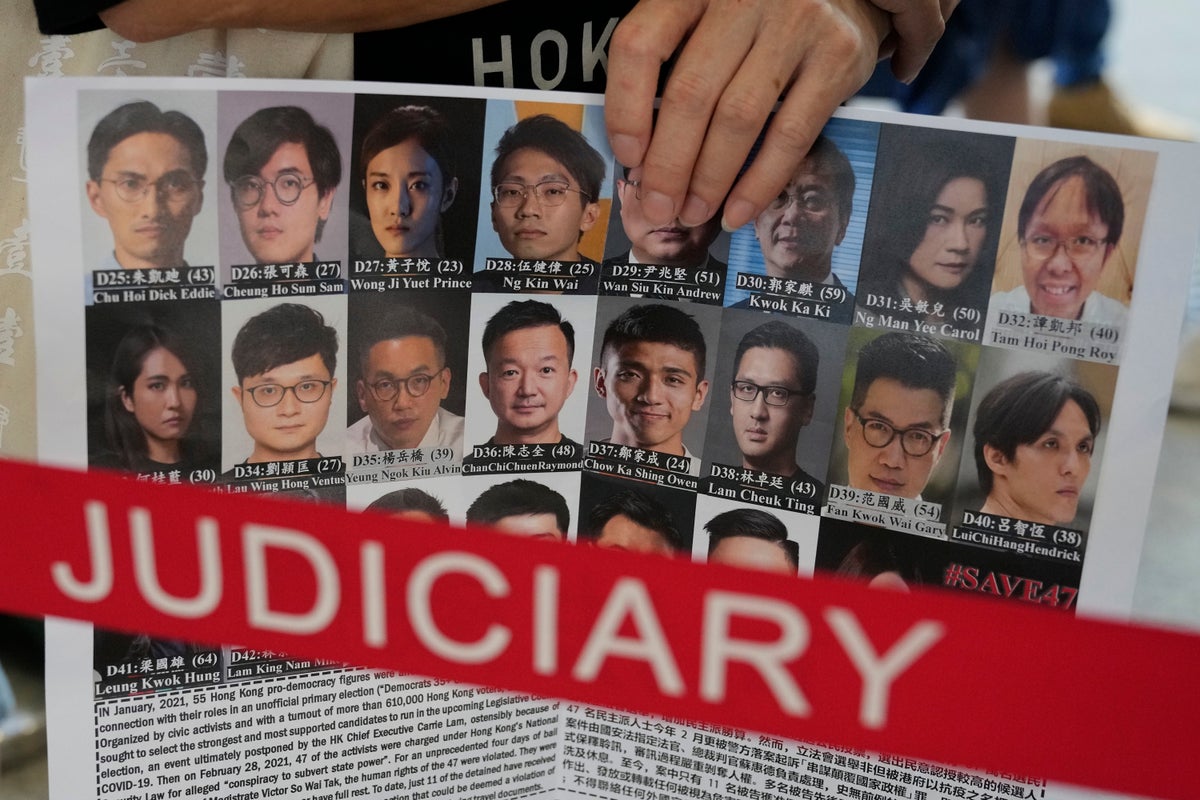
Some of Hong Kong’s best-known pro-democracy activists went on trial Monday in the biggest prosecution yet under a law imposed by China’s ruling Communist Party to crush dissent.
The 18 defendants face up to life in prison if convicted under the national security law critics say is eroding the autonomy promised when Hong Kong returned to China in 1997, and its status as a global business center.
They were among 47 pro-democracy figures who were arrested in 2021 under the legislation that was imposed following protests in 2019. They were charged in connection with an informal 2020 primary election.
The pro-democracy movement has largely dried up after activists were jailed or went into exile. Growing numbers of young professionals have responded to the erosion of Hong Kong’s Western-style civil liberties by leaving for Britain, the United States and other countries. The United States imposed sanctions on officials it said were to blame for the abuses.
The primary in 2020 aimed at picking pro-democracy candidates who could win control of the territory’s Legislative Council. Prosecutors accuse them of trying to paralyze Hong Kong’s government and topple the city’s leader by securing a majority to veto budgets.
The prosecution involves many of the city’s most prominent activists, including legal scholar Benny Tai, former student leader Joshua Wong and opposition party leaders Wu Chi-wai and Alvin Yeung.
In previous proceedings, the 18 activists had indicated they intended to plead not guilty. But two of them — former district councilor Ng Kin-wai and businessman Mike Lam — later changed their minds, joining the other 29 activists, including Tai, Wong, Mo and Wu, who plan to admit the charges.
While most of the 47 activists who were charged with conspiracy to commit subversion were being detained without bail, former lawmakers Raymond Chan and Helena Wong who appeared in court on Monday were among the minority who were granted bail based on strict conditions.
Ahead of the opening statements, the pair, alongside 14 other activists, pleaded not guilty in front of the judges, who were approved by the city’s leader to oversee the case. Ng and Lam pleaded guilty.
Those who intend to plead guilty will receive their sentencing after the trial. Some of them, including Wong and former district councillor Lester Shum, were in the courtroom to observe the trial.
Earlier in the morning, more than 200 people, including relatives and friends of the defendants, lined up outside the court building as local police stepped up security in the area.
Some people at the front of the line, including a group of more than 10 who came at 6 a.m. to secure a seat for the hearing, said they had no clue what the trial was about. That prompted pro-democracy activists among the spectators to question whether they were just trying to occupy the seats so that other members of the public could not get a place to observe the high-profile trial.
Three members of the League of Social Democrats staged a small protest outside the complex, urging the immediate release of all political prisoners. One member was taken away by the police for violating the mask mandate when he took his mask off and tried to speak loudly.
The trial is expected to last 90 days. The case has drawn international scrutiny, with advocacy groups and politicians condemning the charges.
The government postponed the legislative election that would have followed the primary, citing public health risks during the coronavirus pandemic. The electoral system was later overhauled to give Beijing more control over who is elected to Hong Kong’s legislature.
The national security law criminalizes secession, subversion, and collusion with foreign forces to intervene in the city’s affairs as well as terrorism. Apart from the activists, pro-democracy publisher Jimmy Lai is also facing collusion charges under the law.
_____
Associated Press video journalist Alice Fung contributed to this report.







